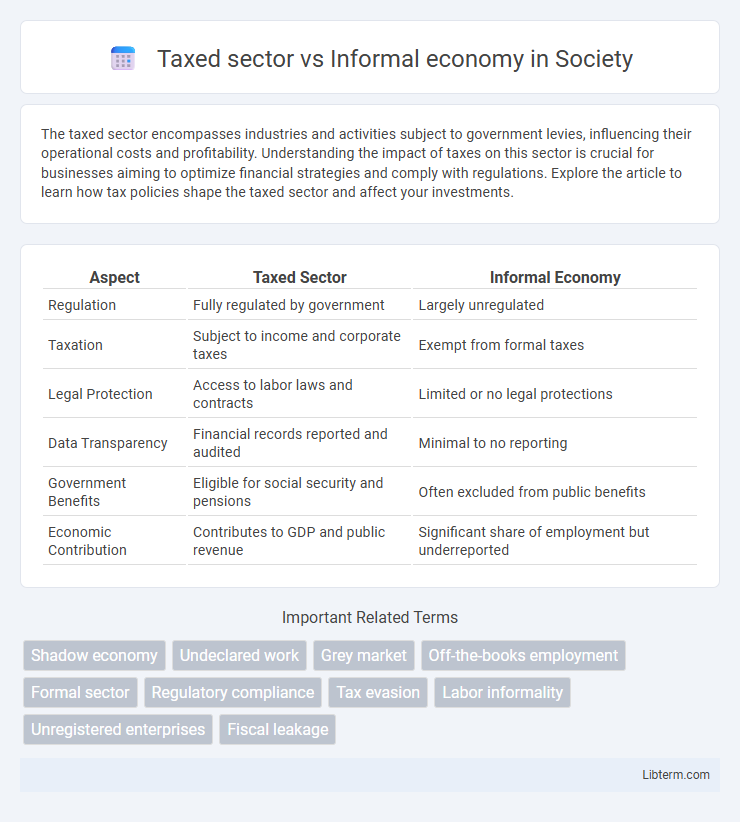The taxed sector encompasses industries and activities subject to government levies, influencing their operational costs and profitability. Understanding the impact of taxes on this sector is crucial for businesses aiming to optimize financial strategies and comply with regulations. Explore the article to learn how tax policies shape the taxed sector and affect your investments.
Table of Comparison
| Aspect | Taxed Sector | Informal Economy |
|---|---|---|
| Regulation | Fully regulated by government | Largely unregulated |
| Taxation | Subject to income and corporate taxes | Exempt from formal taxes |
| Legal Protection | Access to labor laws and contracts | Limited or no legal protections |
| Data Transparency | Financial records reported and audited | Minimal to no reporting |
| Government Benefits | Eligible for social security and pensions | Often excluded from public benefits |
| Economic Contribution | Contributes to GDP and public revenue | Significant share of employment but underreported |
Understanding the Taxed Sector
The taxed sector comprises businesses and individuals whose income and transactions are officially recorded and subject to taxation by government authorities, generating essential public revenue. It includes formal enterprises, wage earners, and registered professionals who comply with tax regulations, facilitating economic planning and social services funding. Understanding this sector helps policymakers identify gaps in tax compliance and design strategies to integrate informal economic activities into the formal system, promoting equitable fiscal contributions and sustainable growth.
Defining the Informal Economy
The informal economy encompasses economic activities that are not regulated or protected by the state and remain untaxed, including small-scale, unregistered businesses and casual labor. Unlike the taxed sector, which operates within formal legal frameworks, the informal economy lacks official recognition, leading to limited access to social security, credit, and legal protections. This sector plays a significant role in many developing countries, often constituting a substantial portion of overall economic activity despite its exclusion from formal taxation and regulation.
Key Differences: Taxed vs Informal Economies
The taxed sector operates under formal regulations, ensuring businesses comply with tax laws and contribute to public revenues, while the informal economy functions outside these legal frameworks, often avoiding taxation. Key differences include the level of government oversight, access to legal protections, and transparency in financial transactions. The informal economy typically lacks official records, limiting economic data accuracy and hindering policy implementation.
Economic Impact of the Taxed Sector
The taxed sector significantly contributes to government revenue, enabling public investment in infrastructure, healthcare, and education, which fosters sustainable economic growth and stability. Formal businesses in the taxed sector adhere to regulations, improving labor conditions and access to credit, thereby enhancing productivity and innovation. Contrastively, the informal economy, largely untaxed and unregulated, limits fiscal capacity and perpetuates inefficiencies that hinder overall economic development.
The Role of Informal Workforces
The informal workforce plays a crucial role in bridging gaps left by the taxed sector, often providing essential goods and services without direct tax contributions. This sector can account for more than 60% of employment in developing economies, highlighting its significance in sustaining livelihoods and local economies. Understanding the dynamics between taxed sectors and informal workforces is key to designing policies that encourage formalization while maintaining economic inclusivity.
Government Policies Affecting Both Sectors
Government policies heavily influence both the taxed sector and the informal economy through regulatory frameworks and taxation systems designed to ensure compliance and increase state revenue. Tax incentives, subsidies, and streamlined compliance procedures encourage formalization of informal businesses, while stringent penalties and enforcement measures deter tax evasion. Policy interventions such as simplifying tax codes and enhancing digital tax administration promote greater transparency, reducing the size of the informal economy while expanding the taxed sector.
Tax Revenue Implications
The taxed sector contributes significantly to government tax revenue through formal registration and compliance, enabling efficient collection of income, corporate, and value-added taxes. In contrast, the informal economy escapes taxation due to lack of documentation and regulatory oversight, leading to substantial revenue losses and reduced fiscal capacity for public services. Strengthening formalization measures and broadening the tax base are crucial strategies to enhance tax revenue and support sustainable economic development.
Challenges in Regulating the Informal Economy
The informal economy poses significant challenges for tax authorities due to its lack of formal records, making accurate revenue assessment difficult. Limited oversight and the absence of regulatory compliance contribute to tax evasion and reduced public revenue collection. Efforts to integrate informal workers into the taxed sector require streamlined registration processes and incentives to encourage voluntary compliance.
Benefits and Drawbacks of Formalization
Formalization of the informal economy increases tax revenue, enabling governments to fund public services such as healthcare, education, and infrastructure development. Benefits include improved legal protections for workers, access to credit, and enhanced business growth opportunities, while drawbacks involve increased compliance costs, potential loss of income due to taxation, and bureaucratic hurdles for small enterprises. Balancing formalization efforts requires strategies that minimize regulatory burdens and provide incentives for informal businesses to transition into the taxed sector.
Future Trends: Bridging the Gap Between Sectors
Emerging technologies and digital platforms are reshaping the relationship between the taxed sector and the informal economy by improving transparency and enabling real-time tax reporting. Government initiatives focusing on financial inclusion, such as mobile banking and digital identification systems, foster formalization of informal businesses, enhancing revenue generation. Predictive analytics and AI-driven policy-making further facilitate targeted interventions to bridge the gap, promoting sustainable economic growth and reducing tax evasion.
Taxed sector Infographic

 libterm.com
libterm.com